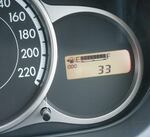
Michael Coghlan via Flickr
Oregon roads aren't being adequately funded by gas taxes, and raising the tax has proved politically difficult. The state has been working on how to make up for those declining revenues for well over a decade, since increases to the state gas taxes haven't kept pace with the costs of the repairing and maintaining Oregon's roads. A "per mile" tax has been proposed by a committee working on these issues, to make up for funds lost due to rising fuel efficiency. Two initial pilots have already been conducted to work out the kinks and address issues, like privacy protection and how the logistics of the system would work.
The first large scale test of a per mile tax will launch July 1, under what the Oregon Department of Transportation (ODOT) has dubbed its OReGO program. It will be limited to 5,000 drivers – 1,500 will drive cars with 17 miles per gallon or less, 1,500 between 17mpg and 22mpg and the rest will drive cars that get over 22mpg.
They’ll pay a per mile tax but get a rebate for any gas taxes they pay at the pump.
"The amount at the fuel pump is offset," ODOT's Tom Fuller said. "So [volunteers] don't pay both."
Fuller has been testing the system with his own car, and plans to volunteer come July 1. He says the program has given him a greater sense of ownership over the roads he drives.
"Now I'm looking at how many miles I drive and how much tax I'm paying to help maintain Oregon's roads and bridges," Fuller said. "I start thinking about the fact that I put $1.50 in today to help maintain these roads. I like that better [than] the invisible tax."
However, many citizens have concerns with the fact that the new tax could remove the state based incentive to have a fuel efficient car. With the current gas tax, the more fuel efficient car you have the less you pay for gas, and subsequently the less gas tax you pay.
"I have a Prius, I'll pay more," Fuller said. "But what we're doing is to inform a conversation that will happen probably in 2017."
The legislature is conducting a test drive of the potential gas tax by using the volunteers in the OReGO program. The gas tax hasn't been raised since 1993, but repair costs on highways have been increasing and people have been paying less and less in gas taxes due to more prevalent gas efficient cars. ODOT hopes the pay-per-mile idea would offset the flat budget that has been allocated to road and bridge maintenance over the years.
The OReGO program will partner with three firms – Sanef, Verizon and Azuga – to provide the mileage tracking software and hardware that will be used in assessment. However, some Oregonians have privacy concerns over what will be done with this tracked data. Many fear that the state will have access to their driving records if mileage is tracked in every car. Also, because the current plan only applies to Oregon, a tax payer would have to inform the government when they cross state lines or pay the tax for miles driven in other states.
"The firms have signed contracts with the state. They supply the devices, they obtain the information and they only report to the state the amount of miles driven and the tax that person would pay," Fuller said. "The state would never have access to that information and the vendors have to destroy it after thirty days."
Whether law enforcement or judges could subpoena the companies in order to obtain the information is uncertain at this point.
"These are some of the things as the program is refined that we will approach," Fuller said.